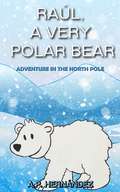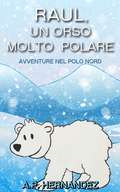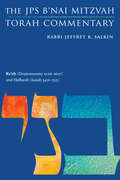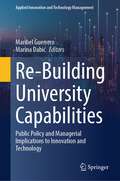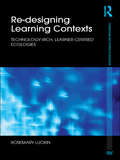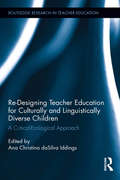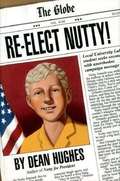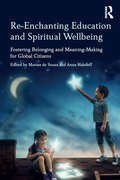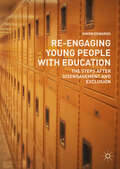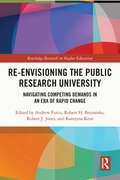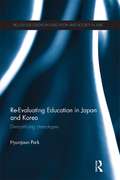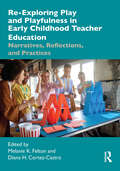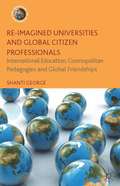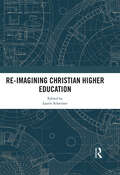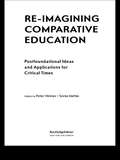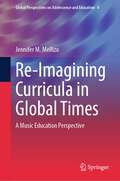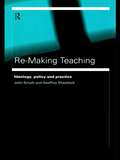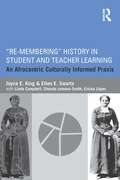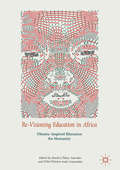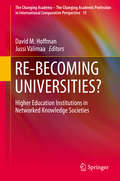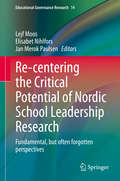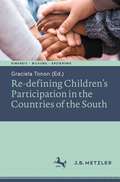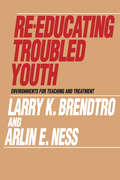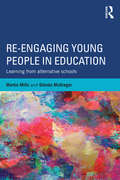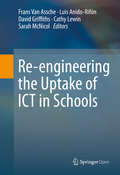- Table View
- List View
Raúl, a very polar bear: Adventure in the North Pole
by A. P. HernándezExplore the animal world. Raúl is a polar bear and Raky is a very talkative Artic hare. She is also his best friend. By reading this book, you can travel with them along the North Pole, you can play at guessing riddles with Raky and you will discover other amazing animals, such as the walrus Leticia, the Artic fox Antonio and... even, a reindeer! Wrap up for this adventure! This book contains many photos of the North Pole and its animals.
Raúl, un Orso Molto Polare. Avventure nel Polo Nord
by A. P. HernándezRaul è un orso polare e Raky è una lepre polare molto chiacchierona e la sua migliore amica. Con questo libro, puoi accompagnarli nel loro viaggio attraverso il Polo Nord, puoi giocare agli indovinelli con Raky e scoprire altri incredibili animali, come il tricheco Letizia, la volpe artica Antonio e ... persino una renna! Copriti e parti per la tua avventura!
Re'eh: The JPS B'nai Mitzvah Torah Commentary (JPS Study Bible)
by Rabbi Jeffrey K. SalkinThe JPS B’nai Mitzvah Torah Commentary shows teens in their own language how Torah addresses the issues in their world. The conversational tone is inviting and dignified, concise and substantial, direct and informative. The narrative summaries, “big” ideas, model divrei Torah, haftarot commentaries, and discussion questions will engage teens in studying the Torah and haftarot, in writing divrei Torah, and in continuing to learn Torah throughout their lives. Re'eh includes: * General introduction * Two model divrei Torah on the weekly Torah portion. * One model davar Torah on the weekly Haftarah portion. Jewish learning—for young people and adults—will never be the same.
Re-Building University Capabilities: Public Policy and Managerial Implications to Innovation and Technology (Applied Innovation and Technology Management)
by Marina Dabić Maribel GuerreroAlthough most universities could be considered bureaucrat organizations, the accumulated knowledge reveals that universities try to adapt their core activities and technological innovation processes to face the current socio-economic challenges. This book explores the ways in which universities have re-built multiple capabilities to support the development of applied innovation and manage new technologies. Concretely, this book (1) theoretically addresses the university managers’ view for re-building university capabilities due to the public policy agendas demands; and (2) empirically addresses the documentation of experiences and strategies adopted by universities in different contexts to achieve public policy agendas. These universities strategies include re-build entrepreneurial, innovative, digital, and sustainable capabilities. This book encourages researchers, scholars, academics, students and policy makers to re-think how universities are expanding equal opportunities related to high-quality higher education, innovative/entrepreneurial graduate options, and contributing to sustainable societal advance and well-being through research and community engagement.
Re-Designing Learning Contexts: Technology-Rich, Learner-Centred Ecologies (Foundations and Futures of Education)
by Rosemary LuckinWhat do we mean by the word ‘context’ in education and how does our context influence the way that we learn? What role can technology play in enhancing learning and what is the future of technology within learning? Re-Designing Learning Contexts seeks to re-dress the lack of attention that has traditionally been paid to a learner’s wider context and proposes a model to help educators and technologists develop more productive learning contexts. It defines context as the interactions between the learner and a set of inter-related resource elements that are not tied to a physical or virtual location. Context is something that belongs to an individual and that is created through their interactions in the world. Based on original, empirical research, the book considers the intersection between learning, context and technology, and explores: the meaning of the concept of context and it’s relationship to learning the ways in which different types of technology can scaffold learning in context the Learner-Centric ‘Ecology of Resources’ model of context as a framework for designing technology-rich learning environments the importance of matching available resources to each learner’s particular needs the ways in which the learner’s environment and the technologies available might change over the coming years the potential impact of recent technological developments within computer science and artificial intelligence. This interdisciplinary study draws on a range of disciplines, including geography, anthropology, psychology, education and computing, to investigate the dynamics and potential of teacher-learner interaction within a learning continuum, and across a variety of locations. It will be of interest to those teaching, researching and thinking about the use of technology in learning and pedagogy, as well as those involved in developing technology for education and those who use it in their own teaching. For practical examples of the way the Ecology of Resources framework has been used visit: http://eorframework.pbworks.com.
Re-Designing Teacher Education for Culturally and Linguistically Diverse Students: A Critical-Ecological Approach (Routledge Research in Teacher Education)
by Ana Christina Da Silva IddingsThrough a critical-ecological lens, this book examines how to prepare preservice teachers to be resourceful and responsive practitioners in addressing the intellectual needs of children often labeled as "culturally and linguistically diverse." It explores a comprehensive re-design of a teacher education program grounded in research on the complex factors that affect the teaching and learning of linguistically and culturally diverse children. Re-Designing Teacher Education for Culturally and Linguistically Diverse Students challenges hegemonic cultural and linguistic norms, quantitative and static views of "resources," the impact of U.S. education policy, and the limited attention to the agency, identities, and strategic actions of diverse students and their families.
Re-Elect Nutty (Nutty Nutsell #8)
by Dean HughesNutty is a boy any kid who reads will want to know. He gets teased, fights with his sisters, isn't stuck up, follows good and bad advice, takes chances, gets caught, sticks with his friends, feels ambitious, is lazy, and is cool in a regular sort of way. In this last book in the series about him it's time to pick a student council president again. The fact that he made a terrible student council president the year before doesn't make a difference. Frederick Nutsell--better known as Nutty--decides he has learned from his mistakes, has a few ideas, and would like to give the presidency another shot. And he is determined to be honest and straightforward throughout the campaign. In fact, he has his slogan all worked out: "I messed up last year, but next year I'll do a better job." But then Nutty learns that the leading candidate is his archrival, Mindy, and the mud begins to get slung. Who is printing up the fliers saying all those rotten things about Nutty? (Even if they are true?) Nutty is sure it is Mindy and her campaign staff, but he can't prove it. How can he stay above it all when these kinds of dirty tricks are being played? Tempted to pull some dirty tricks of his own, Nutty manages only to make things worse for himself, until he finally uncovers the secret behind the dirty tricks--a surprising one at that--and ultimately does the right thing. Those who have read Dean Hughes's Nutty for President and the other books in the Nutty series will be eager to follow these further funny, and poignant, adventures. Look! Bookshare has all eight of the books in the Nutty Nutsell series which are: Nutty for President, Nutty and the Case of the Mastermind Thief, Nutty and the Case of the Ski Slope Spy, Nutty Can't Miss, Nutty Knows All, Nutty the Movie Star and Nutty's Ghost.
Re-Enchanting Education and Spiritual Wellbeing: Fostering Belonging and Meaning-Making for Global Citizens
by Marian De Souza Anna HalafoffEducation is in a constant state of renewal internationally where it responds to a number of pressing social, political and cultural issues. Processes of globalization, a number of conflicts and acts of terror, economic and environmental crises have led to large waves of migration and asylum seekers arriving in countries with the hope of finding safer and more stable places to settle. This, in turn, has led to cultural and religious pluralism being a key characteristic of many societies with corresponding issues of belonging and identity. As well, for many people, there has been a shifting influence of and allegiance away from traditional religious frameworks with the emergence of new religious movements, both peaceful and violent, and a rise in popularity of spirituality and non-religious worldviews which provide alternate frameworks for living healthy and ethical lives. In order to prepare today’s student for tomorrow’s world, one which is confronted by a range of risks and crises and which is being shaped by rapidly changing technologies, educators and researchers are investigating new ways of equipping students to deal with these challenges and opportunities, including the nurturing of spiritual wellbeing. This book brings together the voices of many experienced educators to discuss ways to re-enchant education and re-enliven learning programs in response to these 21st century issues in an increasingly global and interconnected world. It examines a range of international contexts, including secular and religious educational settings, and provides an avenue for visionary voices that identify problems and offer solutions to help shape a more promising education system that will prepare children more constructively and beneficially to flourish in their future worlds.
Re-Engaging Young People with Education: The Steps after Disengagement and Exclusion
by Simon EdwardsThis book examines how young people can be re-engaged with schooling and their own learning beyond the school gates. Despite attempts by successive UK governments to promote engagement with education, there has been a substantial increase in formal and informal exclusions from secondary schools, particularly of underperforming students who come from low income families. The book builds on an ethnographic study carried out in a youth centre based on a secondary school site, exploring the social and cultural worlds of fourteen students as they complete a GCSE teamwork assessment. Analysing the ‘translation’ process of the students as they relocate their understanding of teamwork into the language of assessment, the author posits that student identity is a holistic individual project, where knowledge is produced within the conditions for the production of the self-narrative. This volume calls to educators to recognise the importance of relational pedagogy rooted in social practices, rather than individual cognitive performance. It is sure to be of value and interest to students and scholars of exclusion in education and relational pedagogy, as well as practitioners and policy makers.
Re-Envisioning the Public Research University: Navigating Competing Demands in an Era of Rapid Change (Routledge Research in Higher Education)
by Andrew Furco Robert H. Bruininks Robert J. Jones Kateryna KentThis volume explores the numerous and competing demands that face America’s public research universities and considers how institutions and their leaders can best navigate this challenge to ensure longevity, relevance, and success on the local, national, and global stage. Today’s public research universities have the unique challenge of responding to new societal pressures and policies, while remaining true to their core educational missions and values. Highlighting the multiple roles that universities must now fulfil – as institutions of higher learning, as research bodies, as institutions with global reputations, and as organizations that serve the public – the volume asks how they can best evolve in the rapidly changing education landscape. Tackling subjects such as faculty culture, the role of technology, financial sustainability, institutional identity, diversity, and organizational development, chapters identify innovative and transformative mechanisms for acclimatizing the public research university to current educational, academic, and societal needs. This text will benefit researchers, academics, and educators with an interest in higher education, educational reform and policy, and the sociology of education more broadly.
Re-Evaluating Education in Japan and Korea: De-mystifying Stereotypes (Routledge Studies in Education and Society in Asia)
by Hyunjoon ParkInternational comparisons of student achievement in mathematics, science, and reading have consistently shown that Japanese and Korean students outperform their peers in other parts of world. Understandably, this has attracted many policymakers and researchers seeking to emulate this success, but it has also attracted strong criticism and a range of misconceptions of the Japanese and Korean education system. Directly challenging these misconceptions, which are prevalent in both academic and public discourses, this book seeks to provide a more nuanced view of the Japanese and Korean education systems. This includes the idea that the highly standardized means of education makes outstanding students mediocre; that the emphasis on memorization leads to a lack of creativity and independent thinking; that students’ successes are a result of private supplementary education; and that the Japanese and Korean education systems are homogenous to the point of being one single system. Using empirical data Hyunjoon Park re-evaluates the strengths and weaknesses of the existing education systems in Japan and Korea and reveals whether the issues detailed above are real or unfounded and misinformed. Offering a balanced view of the evolving and complex nature of academic achievement among Japanese and Korean students, this book will appeal to students and scholars of Asian, international and comparative education, as well as those interested in Asian society more broadly.
Re-Exploring Play and Playfulness in Early Childhood Teacher Education: Narratives, Reflections, and Practices
by Melanie K. Felton Diana H. Cortez-CastroThis book explores early childhood teacher educators’ lived experiences in designing and implementing intentional play-based approaches in teaching preservice teachers. The chapters cover action research, teaching stories about playful classroom practices, and diverse narratives about developing preservice teachers’ positive views toward play. Early childhood teacher educators will be encouraged to (re)explore their beliefs about the roles of play and playfulness in higher education. Readers will learn playful strategies to actively engage preservice teachers in building meaningful knowledge about play and how to use play to support young children’s learning across varied cultural contexts, experiences, and individual differences.
Re-Imagined Universities and Global Citizen Professionals
by Shanti GeorgeUniversities are increasingly criticised for their limited relevance to a globalized and unequal world. Drawing on research from over 27 countries, this book outlines new directions for universities and the need to rethink the education that they provide based on the experiences of schools of international development studies.
Re-Imagining Christian Higher Education
by Laurie A. SchreinerRe-Imagining Christian Higher Education takes a fresh and critical look at the challenges facing Christian colleges and universities and provides concrete recommendations for university leaders, faculty, and staff to implement in their daily work. Chapters in this book address leadership and diversity challenges, issues of affordability and sustainability, and ways of maintaining the distinguishing features of a Christ-centered liberal arts education. A vivid and compelling picture of the Christian university of the future is painted by these authors as they highlight the importance of embracing our Christian identity while being willing to engage a pluralistic and fragmented world. Firmly rooted in a missional identity of faithful learning that is committed to the intellectual, personal, and spiritual development of our students, Christian colleges and universities are encouraged to reclaim and revitalize the breadth and depth of the Christian tradition in order to move forward. The chapters in this book were originally published as a special issue of Christian Higher Education.
Re-Imagining Comparative Education: Postfoundational Ideas and Applications for Critical Times (Reference Books in International Education)
by Sonia Mehta Peter NinnesThe original essays included here, by up and coming scholars in the field, illustrate the potential and diversity of post-foundational ideas as applied to comparative education concerns.
Re-Imagining Curricula in Global Times: A Music Education Perspective (Global Perspectives on Adolescence and Education #4)
by Jennifer M. MellizoThrough this book, the author examines the role of music education within the larger global education movement. Specifically, the author argues music education has unique potential to foster positive global identity and to promote higher levels of intercultural sensitivity during adolescence. Music educators can use the framework in this book to craft lessons that will help their adolescent students develop positive global identities as they progress towards higher levels of intercultural sensitivity within the context of musical learning experiences. The book also offers a framework that can help practicing and pre-service music educators to engage in the type of cultural and musical self-reflection needed to resist deeply engrained hegemonic tendencies. As such, more students have access to an inclusive, flexible, and meaningful musical education. Within the final two chapters, the author proposes - and provides concrete examples of - a new curricular planning strategy for music educators which synthesizes the information presented in the preceding chapters and provides a concrete vision for (re)imagining music education as global education.
Re-Making Teaching: Ideology, Policy and Practice
by John Smyth Geoffrey ShacklockDramatic, profound and far-reaching changes are being visited on schools worldwide that have their genesis a long way from the classroom but which impact heavily on teachers and their work. Most of this reform has been achieved with little or no involvement of teachers themselves. This book sets out to survey the contemporary context of what is happening to the work of teaching, and focuses on Advanced Skills Teachers. It shows how teachers are 'speaking' the changes that are occuring to their work in protracted economically rationalist times.Arguing against the discourses of economy as the major shaping force, the authors present a persuasive case for focusing on the discourses of teaching itself as the only feasible and adequate basis on which to make sense of teaching. And by presenting a range of voices of practising teachers - allowing them to speak for themselves about the difficulty of trying to translate policy-makers' intentions into words and actions - the book graphically illustrates the devastating long-term consequences for the future of schools of poorly-conceptualised reform policies.
Re-Membering History in Student and Teacher Learning: An Afrocentric Culturally Informed Praxis
by Joyce E. King Ellen E. SwartzWhat kind of social studies knowledge can stimulate a critical and ethical dialog with the past and present? "Re-Membering" History in Student and Teacher Learning answers this question by explaining and illustrating a process of historical recovery that merges Afrocentric theory and principles of culturally informed curricular practice to reconnect multiple knowledge bases and experiences. In the case studies presented, K-12 practitioners, teacher educators, preservice teachers, and parents use this praxis to produce and then study the use of democratized student texts; they step outside of reproducing standard school experiences to engage in conscious inquiry about their shared present as a continuance of a shared past. This volume exemplifies not only why instructional materials—including most so-called multicultural materials—obstruct democratized knowledge, but also takes the next step to construct and then study how "re-membered" student texts can be used. Case study findings reveal improved student outcomes, enhanced relationships between teachers and families and teachers and students, and a closer connection for children and adults to their heritage.
Re-Visioning Education in Africa
by Emefa J. Takyi-Amoako N’Dri Thérèse Assié-LumumbaThis book presents the case for a conceptual and pragmatic revolution of Africa's formal educational systems. Using the context of Ubuntu-inspired education, the authors explore innovative ways to tackle the challenges faced by governments from the local and national level and beyond. Along the way, the editors and their contributors examine important policy questions to encourage fresh thinking on ways to improve the educational system and, in turn, to buoy the development of the region as a whole.
Re-becoming Universities?
by David M. Hoffman Jussi VälimaaThis book provides anoverview of the major findings of the comparative research project, Changes inNetworks, Higher Education and Knowledge Society (CINHEKS). The main aim ofthis international comparative research project is the analysis of how Higher educationinstitutions are networked within distinct knowledge societies in two keyregions of the world: Europe and the United States of America. This researchproject was carried out in four European countries (Finland, Germany, Portugaland the United Kingdom) and in two different states in the United States ofAmerica. In addition, during the course of the research, a team from theRussian Federation joined the CINHEKS study. The analysis is contextuallygrounded in a comparative policy analysis focused on the main developments andunderstandings of the ideas surrounding the term knowledge society, in allcountries concerned. Empirical elaboration is established via a series ofsequential studies, each building, incrementally, on the previous study. Thesestudies include institutional profiles of higher education institutions,institutional case studies, and an international comparative survey thatilluminates academics' social networks. The research findings broaden ourunderstanding of the differences and similarities in how higher educationinstitutions and individual academics are networked within and between societiesthat understand themselves as knowledge societies. The book introduces a novel analytical synthesis, which asserts contemporary societies have evolved into Networked Knowledge Societies. Methodologically, the book both challenges and raises the bar for previous approaches in comparative higher education, in terms of research design, execution and lays the groundwork for a new generation of international comparative higher education research.
Re-centering the Critical Potential of Nordic School Leadership Research: Fundamental, but often forgotten perspectives (Educational Governance Research #14)
by Lejf Moos Jan Merok Paulsen Elisabet NihlforsThis volume contributes significantly to the ongoing international and Nordic paradigm shift in educational leadership research. It advocates for going from a contemporary, mainstream functionalist paradigm to a reflexive paradigm, based on educational values and knowledge. The volume is built on the shared basis, that the purpose of education is, and must be, fundamental for school leadership practice. However, that is often forgotten in educational governance and policy. The basis of the argument is, that educational leadership needs to change from focusing on effectiveness and narrowly defined accountability towards focusing on leadership that is contributing to the general education of students. That entails that leadership research need to focus on complex perspectives like context, relations, trust, sense making and social and human values, and less on control, outcomes, accountability and testing. The volume reminds readers about the need to raise awareness of the contexts of education and research, be they political, cultural, economic or ideological. Chapters analyze, discuss and compare research from Nordic educational leadership research systems: Denmark, Finland, Iceland, Norway and Sweden. The cross-system insights clarify the fundamental relations between policy/governance and research/practice are and discuss forgotten dependencies and opportunities.
Re-defining Children’s Participation in the Countries of the South (Kindheit – Bildung – Erziehung. Philosophische Perspektiven)
by Graciela TononThe focus of this book is centered on the participation of children in countries of the South. In this sense, it will review the possibilities of children's participation, as well as their forms of participation in different contexts of daily life. There has been a tendency to underestimate children’s role as active constructors of their surrounding social space, as well as of the internalized interpretations of the way social life operates. Today it is necessary to recognize that children are agents actively involved in the construction of their own lives and the life of the societies they live in; and in this sense, it is important to consider and re-signify the participation of boys and girls as a fundamental pillar in the process of building societies in the 21st century. The book contains chapters that re-significate children’s participation in different countries from South America and South Africa, in relation with different topics: well-being, methods, citizenship, poverty, education, rurality, ethics and human rights.
Re-educating Troubled Youth
by Alexis de TocquevilleThis book is about helping troubled young people who are searching separately for security, identity, and purpose in their lives. Childhood and adolescence are pivotal stages in the quest to belong, to become somebody, and to be worth something. Children need stimulation, affection, and guidance in order to develop their potentials, but many are reared in environments that deprive them of these nutriments. Adolescents approach the threshold of independence with only the experiences gained from childhood; many lack the support of significant actions. Those who encounter difficulty in navigating through these turbulent years are to be identified by society as troubled or troublesome. These children and youth present challenges that do not yield to simple panaceas. Although no simple approach holds all the answers, bridging various concepts of education and treatment offers the best opportunity for creating positive changes. The authors refer to this process as -re-education- with full awareness that this term has been used in a variety of philosophical contexts including behavioral, ecological, and psychodynamic views.
Re-engaging Young People in Education: Learning from alternative schools
by Martin Mills Glenda McGregorMany young people failed by the school system are those who face a range of social and economic challenges due to multiple forms of injustice. This book provides an insight into the educational practices that work to re-engage young people who have become disenchanted with traditional schooling. It examines the lives of students and workers who participate in education sites on the fringes of mainstream education, and includes a rich tapestry of personal experiences from those who have been failed by their schooling experiences. The book draws upon research of international relevance conducted in a range of ‘Flexible Learning Centres’ and ‘democratic schools’ in Australia and the UK; it suggests that improving the retention levels of young people in formal education will require schooling practices to change. Students who have become disengaged from mainstream schooling do re-engage in the learning process of many alternative schools, indicating that teaching practices and forms of organisation which work in alternative sites can also provide lessons for mainstream schooling, thereby encouraging a more socially just education system.Included in the book: contexts of contemporary schooling who chooses flexible learning centres and why democratic schools: students and teachers working together teaching in ‘the margins’ case studies: ‘oppositional alternatives’. All young people have the capacity to learn and to enjoy learning; they do not ‘fail school’, rather, schools fail them. The teachers, workers and students who have shared their stories provide significant insights into how we might change this situation, and the book will be invaluable reading for postgraduates and researchers in the fields of education, the sociology of education, school reform and social work.
Re-engineering the Uptake of ICT in Schools
by David Griffiths Cathy Lewin Frans Van Assche Luis Anido Sarah McnicolThis book reports on a novel and comprehensive approach to the uptake of ICT in Schools. It focuses on key questions, pedagogically sound ways of introducing ICT, new technical artifacts supporting the approach, the evaluation in a large-scale validator, and future work. While many innovations in Technology Enhanced Learning (TEL) have emerged over the last two decades, the uptake of these innovations has not always been very successful, particularly in schools. The transition from proof of concept to integration into learning activities has been recognized as a bottleneck for quite some time. This major problem, which is affecting many TEL stakeholders, is the focus of this book which focuses on developing a more effective and efficient approach based on more than 2500 pilots in European classrooms. Teachers, head teachers, and policy makers may benefit from reading how novel learning scenarios can be elaborated, adapted to a local context, and implemented in the classroom; how new technologies can support this process for teachers and their national/regional communities; how teachers and other stakeholders can be educated in such a re-engineering process; how the approach can be scaled up through MOOCs, ambassador schemes, and train-the-trainer programs; how future classroom labs can inspire teachers, head teachers, and policy makers; how teachers and, above all, learners can become more engaged in learning through the adoption of the iTEC approach. Readers with a more technical focus may also be interested in the discussion of recommender systems, the flexible provision of resources and services, the deployment of the cloud in schools, and systems for composing technological support for lesson plans.
